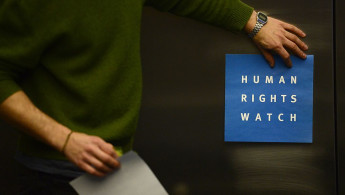'No heaven, nor hell': Morocco press council slams HRW 'biased' report
Human Rights Watch’s (HRW) report on freedom of speech in Morocco is 'politically biased' and 'not ethical', said the country's National Council of Press on Sunday.
Youness Moujahid, the head of Morocco's official body for journalists, slammed the international rights group for "hand-picking" cases for the report in order to depict the kingdom as "the hell for journalists".
HRW published a 142-page report last week accusing Rabat of creating an "ecosystem of repression" to stifle criticism, through smear campaigns against dissidents, intimidation of their relatives, and digital surveillance, mainly using the Pegasus spyware. These accounts have been rejected by the Moroccan government and linked bodies.
"The report was selective, as it focused on some issues through one narrative, which gives the impression that the situation is black in Morocco," Moujahid told Moroccan media.
"When you read the report, you feel that you are facing a closed country that greatly narrows down freedoms... Our country is not heaven nor hell," he continued.
While depicting itself as an independent body, the National Council of Press has been accused of being a mouthpiece for the Moroccan government.
In 2021, Amnesty International claimed Rabat has used Pegasus spyware, produced by the Israeli firm NSO Group, to hack the smartphones of journalists. Morocco has denied the allegations.
The latest HRW report stated that Moroccan journalists have been routinely oppressed for criticising the state.
"Moroccan authorities have developed and refined an array of tactics to silence dissent while claiming merely to be neutrally enforcing its criminal laws," read the report.
"In doing so, the authorities violated a long list of rights, including the rights to privacy, health, physical safety, property, and the right to a fair trial, while also making a mockery of serious crimes, such as rape, embezzlement, or espionage."
Maati Monjib, a historian and free speech activist, who was himself jailed for three months in 2021 on money-laundering charges, said the political trials of the past gave prestige to Moroccan dissidents and made them heroes in the eyes of the public.
"Designating them as traitors, thieves, and rapists – that's a better way to silence them," HRW quoted Monjib.
The report's title was inspired by the words of Omar Radi, a Moroccan investigative journalist who was jailed on espionage and rape charges just a few weeks after speaking to HRW.
Morocco's press council, which has avoided taking a stand in any of the cases HRW mentioned, accused the international rights group of "seeking geostrategic goals".
"Organisations have funders and seek to achieve geostrategic goals, and we should not deal with the issue with a kind of naivety," Moujahid said during his interview with the Moroccan website Hespress.
Mujahid's accusations echoed the official response of the Moroccan state facing HRW's investigation.
Last Thursday, Mustapha Baitass, the spokesperson of the Moroccan government, said that HRW's report is nothing but a compilation of a set of allegations.
"It is a hostile approach that aims to undermine the human rights gains of our country," Baitass told reporters during last week's press conference.
For the past years, the Moroccan state has several times attacked HRW's reports on freedoms in the kingdom and the repression Sahrawi activists.
Morocco was ranked 135th in Reporters Without Borders’ 2022 World Press Freedom Index.
After a relatively gentle approach to anti-government and corruption protests in 2011, Morocco steadily climbed the ranking of World Press Freedom.
Freedom of the press has since receded in the kingdom with many journalists self-censoring their writings to avoid arrest.





 Follow the Middle East's top stories in English at The New Arab on Google News
Follow the Middle East's top stories in English at The New Arab on Google News

![MP Essam Diab's pursuit to block TikTok in Egypt has revived an already ongoing debate in the country. [Getty]](/sites/default/files/styles/image_330x185/public/1230748046.jpeg?h=a5f2f23a&itok=-8MqBLLC)
